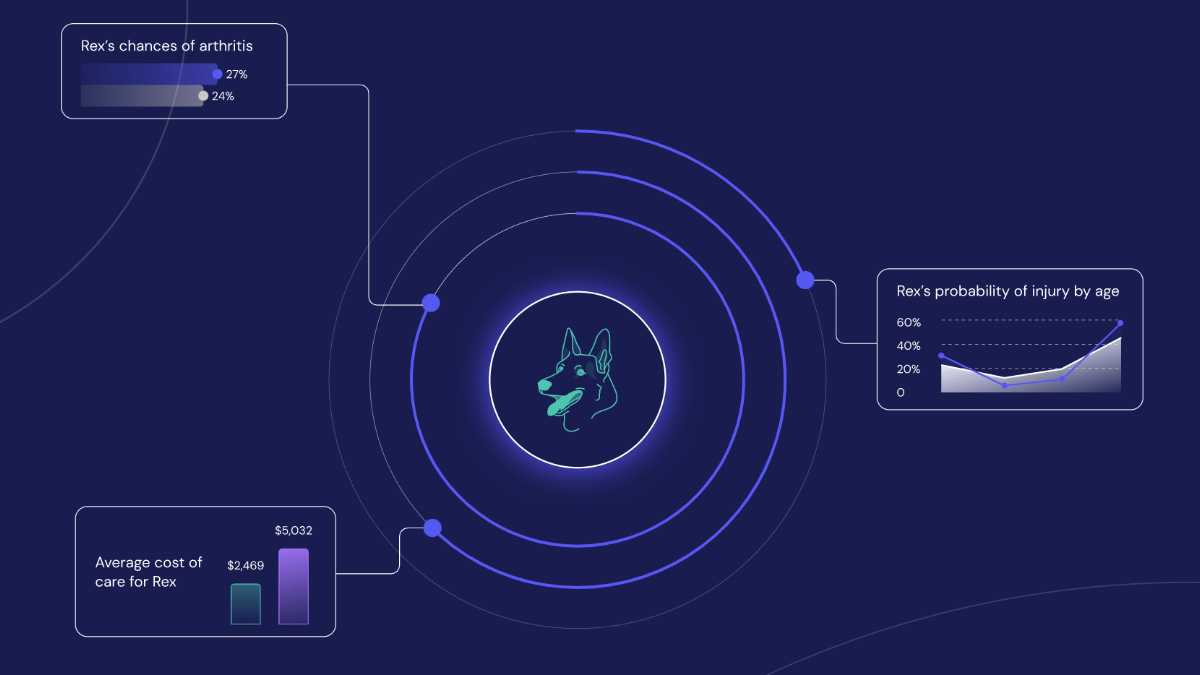
Hi ,A quick question before we get started... where did the time go!? It's already December 4th, which depending on your perspective could be a good thing or a bad thing. But we know for a fact it's just:- 14 days until the start of Hanukkah- 21 days until Christmas- 22 days until the start of Kwanzaa - 27 days until 2023 (which may mean your end-of-year continuing education requirements are due)Time flies. But no sense dwelling on the inevitable forward march of time. Let's march right into the latest across veterinary medicine and the animal kingdom:🖥️ Predicting health issues with AI📈 A new business model for vet clinics☀️ How climate change is affecting mating patterns of animals🚀 Quick hits

Image via Fetch by The Dodo.
Usually when we talk about artificial intelligence, we're looking at the applications of the emerging tech in the clinic as a diagnostic tool. But today, a client-facing tool caught our eye...Pet insurance company Fetch by The Dodo (yes, the same Dodo that is all over your social media with cat videos) has just launched a 'pet health prediction' tool that helps dog parents predict the illnesses and accidents their canine is prone to. The service is being promoted as the first-of-its-kind and uses AI, machine learning and consultation with veterinarians to predict health conditions in dogs. The goal is to equip owners key insights that can help them take preventative measures at an earlier stage. Fetch says it has taken 16 years of clinical health findings and 150+ million data points from over 725,000 dogs to be able to "accurately predict future illnesses, injuries, and accidents."We're not so sure they'll be able to predict accidents (isn't that what makes the accidents?), but maybe this isn't such a bad thing overall. While we may know what breeds are more common to develop cancer or have hip dysplasia - it's far from common knowledge among pet parents. The challenges will occur in the ethical implications of such information. Will we see rates rise or exclusions put in place because of what the AI decides? This could represent a dangerous precedent. On the positive side, knowledge is power, and perhaps pet parents will be able to make more informed decisions, understand the potential cost of veterinary care, and seek treatment earlier for their furry friends.
A new breed of vet clinics is proliferating and you can recognize them by their brand new modern interior design and sleek branding. It's no secret that they're positioning themselves as the upscale, and more enjoyable alternative than the local VCA. With staff shortages and increased wait times dominating the coverage of veterinary care over the last 2 years, some clinics are turning toward another exclusive tactic, this time to attract clients: membership based veterinary care. Members-only vet clinics have popped up in New York, California, Toronto and more. Members-only vet clinics will appeal to clients because for a yearly fee they skip the line and have guaranteed access to a same-day or next-day appointments. Not to mention that often times membership fees include an annual exam and access to 24/7 virtual care. On the veterinary side, in theory, it should mean a manageable workload and a predictable schedule. But adding even higher client expectations to the mix means it can’t be all rose and no thorn... right? Have you ever worked members-only clinic? Let us know your experience by replying to this email.
We're pretty sure this isn't what Nelly meant he released his 2022 single
Hot in Herre,
but new research is showing that as temperatures rise due to climate change, mating behaviors of many animals are changing.
As
, reports as part of the first installment of a new series called Hidden Planet, typically, animals find a mate based on phenotypes, where grander, flashier or more flamboyant features than its competitors is preferred. Evolutionary biologists say those eye-catching displays are an indicator of good genes, which females want to pass along to their offspring.
But often-times those phenotypes are energy draining traits that may not be worth the effort when the world around is heating up. Take the dragonfly, whose highly contrasted wing patterns featuring dark pigmentation attracts female mates. High amounts of dark pigmentation on a dragonfly’s wings can heat up the insect by as much as 3.5 degrees Fahrenheit - which is too much for a dragonfly in today’s climate. In a
of more than 3,000 dragonflies, researchers found that males have now opted for less pigmentation in recent decades. During Earth’s hottest years, males displayed the least amount of color.
While some males may change their appearance to combat the effects of climate change, others are not so lucky. Lions with dark, heat-absorbing manes could develop better panting skills, seek shade more often or take longer breaks after sex (during which males with lighter manes could swoop in on the lionesses).
Interestingly, there is also emerging data that females across species are less picky when choosing a mate in hotter temperatures.
found that female European corn borer moths became less selective of a particular seductive pheromone in males at higher temperatures. Another
found that female fruit flies, who typically mate with only one male, expanded the number of mates at higher temperatures.
It's possible that females may be stressed out at higher temperatures or even struggle to survive, so they are more focused on reproducing, as it may be their last chance.
The Hidden Planet series is sure to bring us more interesting nuggets about animals and our planet. We’ll keep an eye out for more and be sure to feature them in future issues of Weekend Rounds.
Here are some stories we're following this week from around the veterinary world and animal kingdom:
New mobile app designed for vets practicing virtually [DVM 360]
The wild life of wildlife veterinarians [AVMA]
Dogs may be key in early bladder cancer detection [Purdue]
Indigenous youth explore the world of veterinary medicine thanks to new grant [U Calgary]
How much would you pay to save your cat's life? [The Atlantic]
CUVET successfully developed the first stem cell transplantation technology to treat pet diabetes [Yahoo!]
Fluralaner and ivermectin may help eliminate bedbugs [UPI]
Help us improve Weekend Rounds by letting us know if you enjoyed this newsletter:
Share Weekend Rounds:



